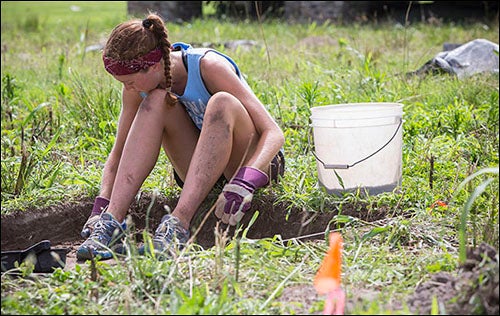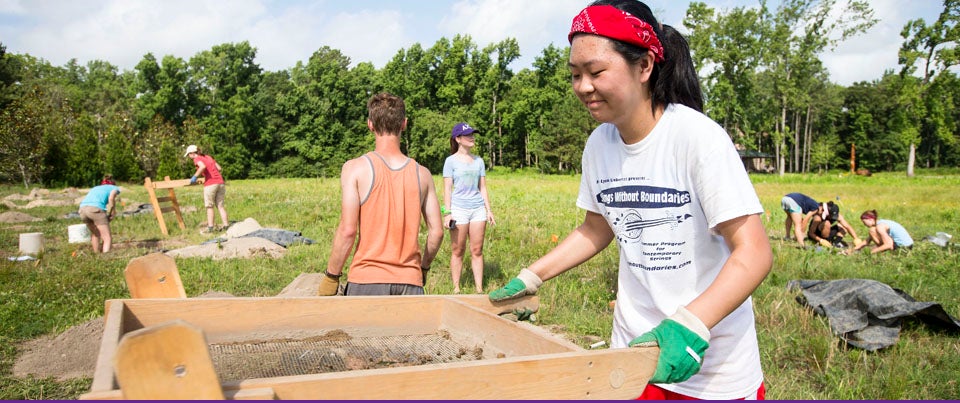DIGGING UP THE PAST
High schoolers assist ECU archaeologists at Pitt County plantation
Ten rising high school juniors and seniors got busy this summer digging and sifting through 18th century dirt behind a standing slave cabin in Grimesland.
That’s because Charles Ewen, professor of anthropology and director of the East Carolina University Phelps Archaeology Laboratory, is overseeing the students in the Summer Ventures project at the Grimes Plantation. He and two ECU anthropology graduate students are searching for “activity areas and deposits” from slave life before the Civil War.
“Archaeology has showed us a lot more about slave life than ever gets written down,” said Ewen. “The owners rarely write anything about how the slaves are living. The slaves are illiterate, so they don’t write much about themselves. The only way we’re going to find out about these guys is through archaeology.”
The state-funded program, which runs this year from June 23 through July 18, is also offered at Appalachian State University, North Carolina Central University and University of North Carolina at Charlotte.
Eleventh-grader Yong Su An, from Northwest High School in Greensboro, said Summer Ventures has allowed him to further explore his interest in anthropology and archaeology. “I’ve always loved history, so digging to find stuff about the past really intrigues me,” he said.
This is Ewen’s 10th year with the Summer Ventures program. “If you had asked me when I first came to ECU, 20 years ago, ‘Would you like to take a dozen high school kids out to dig in the hottest part of the summer?’ I’d say, ‘Are you kidding me? I don’t even want to be out there,’” he said.

Since very little was written about slave life, artifacts found at the site can help tell the story.
But he said he has been pleasantly surprised by the experience. “Most of the kids, when they got out there, had never used the business end of a shovel. But they get into it, and honestly, it is hot and it is dirty, but they don’t complain,” he said.
After the students finish their field work, they write a research paper about archaeology and their excavation.
“They really do contribute,” Ewen said. “They’re doing real research, so it’s not just a made-up dig that I’m having them practice with. It’s real data that I need.”
Mariah Menanno, an 11th-grader from Research Triangle High School in Raleigh, said she could not wait to start. “When I was little, I was really interested in dinosaurs, so I’ve always wanted to dig to see what I could find in the ground,” she said.
“One of the unfortunate things about high school is that students don’t get to learn about archaeology or anthropology,” said C.J. Idol, an ECU anthropology graduate student from Kernersville. “Summer Ventures is a chance for them to learn something beyond what they would get in regular high school classroom,” he said. “Even if we don’t turn them into archaeologists, we can turn them into supporters of archaeology.”

Summer Ventures participant Hanna Peterman works on a section of ground near the slave quarters of the Grimes Plantation.
The excavation units Ewen opened this summer are based on shovel tests Summer Ventures students dug last year.
“Shovel tests are just shovel holes where you’re looking to see if there’s stuff in it or not. It’s to narrow down the areas that are going to be productive for excavation units,” said Ewen.
So far, mostly 19th and 20th century artifacts such as glass, pottery and buttons have been found on the plantation, but Ewen is hoping to find the refuse pits where four other slave quarters once stood.
“It’s really cool that we still have one of the slave quarters standing because usually they get knocked down since they weren’t (considered) that important,” said Idol.
The Grimes Plantation is on the National Register of Historic Places and was the home of Civil War Major General Bryan Grimes. The estate was started by Grimes’ grandfather in the 1790s and was primarily used to produce cotton until Grimes’ death in 1880.
Ewen said there were probably more than 100 slaves working on the plantation at its peak. He hopes to find out more about their daily lives, including their diet and how much of their African heritage they had retained. Since joining ECU in 1994, Ewen has directed projects at Tryon Palace Historic Sites and Gardens in New Bern, Fort Macon State Park in Carteret County, Hope Plantation in Windsor, Somerset Place near Creswell, and conducted a long-term archaeological study of historic Bath.
“For being a relatively small department, we’ve got a very active archaeological program. We do prehistoric, historic, forensic and Middle Eastern archaeology,” he said
Archaeology and Reality TV
The Grimes Plantation was recently filmed by producers with the National Geographic Channel show “Diggers.”
Charles Ewen, president of the Society for Historical Archaeology, said when “Diggers” first aired, archaeologists did not like it very much.
“To us, it looked like people with metal detectors looting historic sites.”
Ewen and others from the society wrote letters of protest to the National Geographic Channel and other shows, such as “Savage Family Diggers,” “Dig Fellows” and “Dig Wars,” arguing the shows promote the destruction of archaeological heritage by misrepresenting research methods and evading preservation law.
“We protested all of these shows and the only one that really cared was the National Geographic Channel,” said Ewen.
The National Geographic Channel brought Ewen, along with other leaders in the archaeological field, to Washington, D.C., to discuss how they could make their show better.
According to Ewen, many of the things discussed were implemented the following season. However, when the National Geographic Channel started calling archaeologists to work with “Diggers,” many were still reluctant because of the previous controversy.
Ewen decided to encourage his hesitant colleagues by inviting “Diggers” to the Grimes Plantation.
When the actors from “Diggers” found artifacts on the plantation, Ewen told the producers to have the actors ask him how much they were worth.
“When they asked me, of course I said, ‘I don’t know how much they are worth monetarily. To me their value lies in what they can tell me about the site and the people that lived there in the past,’” he said.
Although none of the footage from the Grimes Plantation was used in the show, Ewen said being on shows like “Diggers” is a good opportunity for archaeologists to reach an audience they usually don’t get to talk to.
“One half hour episode of “Diggers” reaches more people than every book I have ever written,” he said.
The “Diggers” episode that featured eastern North Carolina ran May 16. To view the part about the Grimes Plantation that was cut from the final “Diggers” broadcast, go to www.ecu.edu/cs-admin/news/ewenonng.cfm.
